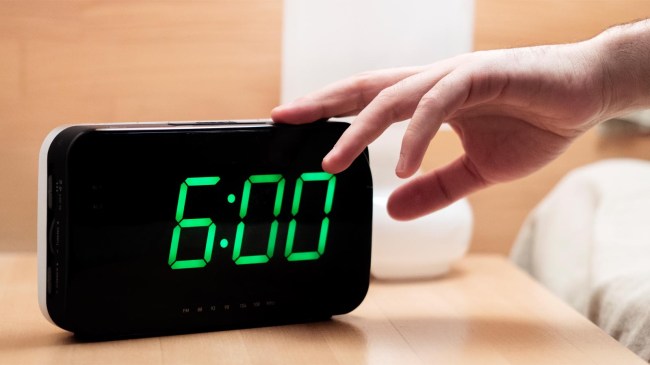iStockphoto
A new study explains how hitting the snooze alarm repeatedly in the morning can negatively affect your brain and can actually cost you sleep in the long run. Unfortunately, this habit is a common one as more than 55 percent of sleep sessions recorded for the study ended with the subject hitting the snooze alarm.
For the study, researchers at Mass General Brigham analyzed sleep data from over 21,000 people over a combined 3 million nights using the Sleep Cycle app. They found that 45 percent of the people in the study hit their snooze alarm in the morning over 80 percent of the time. The heaviest snooze alarm users spent about 20 minutes every morning snoozing.
“Many of us hit the snooze alarm in the morning with the hope of getting a ‘little more sleep,’ but this widely practiced phenomenon has received little attention in sleep research. In a global sample we found that more than half of sleep sessions end in a snooze alarm, and users spent an average of 11 minutes in between snooze alarms each morning before waking,” said lead author Rebecca Robbins, PhD, in the Division of Sleep and Circadian Disorders Medicine at Brigham and Women’s Hospital, a founding member of the Mass General Brigham healthcare system.
The researchers also found in their study, published in the journal Scientific Reports, that women used the snooze alarm significantly more than men. They also learned that sleep session of nine hours or more led to more snooze alarm use than sessions shorter than nine hours. The data also revealed that people who went to bed earlier used snooze alarm less, while those who went to bed later than usual used the snooze alarm more.
Researchers also discovered that people were far more likely to snooze during the workweek, especially from Monday through Friday, and that people in the U.S., Sweden, and Germany had the highest snooze button use, while those living in Japan and Australia had the lowest.
“Unfortunately, the snooze alarm disrupts some of the most important stages of sleep,” said Robbins. “The hours just before waking are rich in rapid eye movement sleep. Hitting the snooze alarm will interrupt these critical stages of sleep and typically only offer you light sleep in between snooze alarms. The best approach for optimizing your sleep and next day performance is to set your alarm for the latest possible time, then commit to getting out of bed when your first alarm goes off.”
Ways to avoid this overuse of the snooze alarm include getting the recommended amount of sleep each night (seven to nine hours), but it is key that you are doing it on a consistent basis. It is also recommended that people go to bed at around the same time every night, even on weekends. Having your alarm go off each day around the sunrise and allowing the morning light to help you wake up naturally is also recommended.
“We talk a lot about wind down routines and bedtime rituals. I think morning rituals are also really lovely to help you get excited about your day,” Robbins told CNN. “It’s important to find something to look forward to, whether that’s a meeting in the morning, making yourself a cup of coffee, whatever helps motivate you (and) gets you out of bed.”
Content shared from brobible.com.

